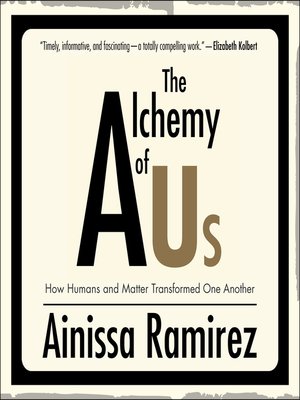The Alchemy of Us
audiobook (Unabridged) ∣ How Humans and Matter Transformed One Another
By Ainissa Ramirez

Sign up to save your library
With an OverDrive account, you can save your favorite libraries for at-a-glance information about availability. Find out more about OverDrive accounts.
Find this title in Libby, the library reading app by OverDrive.



Search for a digital library with this title
Title found at these libraries:
| Library Name | Distance |
|---|---|
| Loading... |
In The Alchemy of Us, scientist and science writer Ainissa Ramirez examines eight inventions—clocks, steel rails, copper communication cables, photographic film, light bulbs, hard disks, scientific labware, and silicon chips—and reveals how they shaped the human experience. Ramirez tells the stories of the woman who sold time, the inventor who inspired Edison, and the hotheaded undertaker whose invention pointed the way to the computer. She describes, among other things, how our pursuit of precision in timepieces changed how we sleep; how the railroad helped commercialize Christmas; and how a young chemist exposed the use of Polaroid's cameras to create passbooks to track black citizens in apartheid South Africa.
Ramirez shows not only how materials were shaped by inventors but also how those materials shaped culture, chronicling each invention and its consequences—intended and unintended. Filling in the gaps left by other books about technology, Ramirez showcases little-known inventors who had a significant impact but whose accomplishments have been hidden by mythmaking, bias, and convention. Doing so, she shows us the power of telling inclusive stories about technology. She also shows that innovation is universal—whether it's splicing beats with two turntables and a microphone or splicing genes with two test tubes and CRISPR.
Ramirez shows not only how materials were shaped by inventors but also how those materials shaped culture, chronicling each invention and its consequences—intended and unintended. Filling in the gaps left by other books about technology, Ramirez showcases little-known inventors who had a significant impact but whose accomplishments have been hidden by mythmaking, bias, and convention. Doing so, she shows us the power of telling inclusive stories about technology. She also shows that innovation is universal—whether it's splicing beats with two turntables and a microphone or splicing genes with two test tubes and CRISPR.







